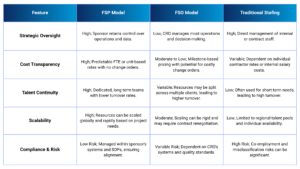FSP Solutions: The Future Industry Standard in Life Sciences Outsourcing
As the life sciences industry rapidly evolves to meet increasing demands for speed, innovation, and cost efficiency, outsourcing models are transforming accordingly. Functional Service Provider (FSP) solutions are emerging as the new industry standard, bridging the gap between traditional Staffing and Full-Service Outsourcing (FSO). For clinical research organizations, adapting to the growth of the FSP model is essential. This paper outlines the benefits of FSP services, their unique alignment with the operational needs of pharmaceutical, biotechnology, and medical device companies, and their growing role as the strategic model of choice across the industry.
“Outsourcing” in the pharmaceutical, biotech, and medical device sectors has historically relied on two primary models: Staff Augmentation (Staffing) and Full-Service Outsourcing (FSO). However, Functional Service Provider (FSP) models are rapidly becoming the preferred choice for many organizations, thanks to their hybrid nature—offering both strategic control and operational scalability. For industry stakeholders, recognizing FSP’s growing dominance is vital to staying competitive and relevant. This paper presents a compelling case for FSP solutions as the future standard in life sciences outsourcing.
The Shift Toward Strategic Partnership Models
FSP models are not a departure from Staffing—they are its evolution. Where traditional staffing provides individual resources for temporary gaps, FSP embeds trained, dedicated teams within sponsor environments, aligning them with internal systems, SOPs, and performance metrics. This provides a value-added service beyond headcount fulfillment, moving the model from transactional to strategic.
Sponsors today demand more than just bodies—they want outcomes, quality, and continuity. The FSP model delivers dedicated FTEs with deep domain expertise who work as integrated extensions of sponsor teams. For sponsors managing global trials, the ability to scale quickly while maintaining SOP compliance and oversight makes FSP a clear winner over traditional models.
Why FSP is Becoming the New Standard
FSP solutions empower sponsors to retain oversight of clinical operations while delegating functional execution. Unlike FSO, where control is ceded to CROs, FSP maintains alignment with internal priorities, making it particularly attractive in highly regulated industries.
This positions FSP in a kind of “Goldilocks Zone”, it’s not too rigid and opaque like Full-Service Outsourcing, and not too transactional like traditional Staffing. It strikes the right balance: giving sponsors the strategic control they need, while offering the scalability and integration required for complex, global operations. For life sciences companies navigating high stakes, tight timelines, and regulatory scrutiny, FSP delivers a model that’s “just right.”
Staffing models often suffer from high turnover, inconsistent training, and misalignment with sponsor systems. FSP providers overcome this by building dedicated teams trained on the sponsor’s platforms and goals, delivering higher productivity and lower attrition over time.
FSP pricing models—typically based on FTE rates—offer greater budget predictability and reduced administrative burden. Unlike bundled FSO contracts or premium hourly rates in staffing, FSP contracts support longer-term resource planning and financial visibility.
Global clinical trials demand a presence in multiple geographies. FSP providers have established regional teams and infrastructure, enabling sponsors to scale operations without the cost of internal expansion. This global reach makes FSP solutions ideal for fast-growing biotech firms or device companies expanding into emerging markets.
Rather than viewing FSP as a threat, staffing firms can evolve their service offerings to include FSP capabilities. Doing so positions them to win long-term, strategic partnerships with life sciences clients—offering value through integration, quality control, and operational efficiency.
For staffing-focused organizations, entering the FSP space represents a significant opportunity to move up the value chain. This means developing teams with domain-specific expertise, building delivery infrastructure, and partnering with sponsors at a strategic level—not just supplying talent but delivering functional excellence.
FSP solutions represent the future of outsourcing in the life sciences industry. They offer the best of both worlds—strategic alignment and scalable delivery. For stakeholders in the staffing sector, FSP is not only a smart business move—it is essential for relevance in a market where clients are demanding deeper partnerships and greater accountability. The FSP model is no longer a niche approach; it is the emerging industry standard that blends operational excellence with sponsor-led control, positioning it as the blueprint for the next generation of outsourced service delivery.





